Best ERC-20 Wallet 2024-2025 for Beginners and Advanced Users
Managing and securing your digital assets efficiently is crucial in the ever-evolving world of cryptocurrency. One of the most popular tokens in the Ethereum ecosystem is ERC-20 tokens, which have become widely used for various purposes. Whether you’re a newcomer to the crypto space or an experienced trader, selecting the right wallet for your ERC-20 tokens is essential. This article will explore the best ERC-20 wallet options for 2024-2025 that cater to beginners and advanced users.
What is ERC-20?
ERC-20 is a technical standard for creating and issuing smart contracts on the Ethereum blockchain. It defines a set of rules that all ERC-20 tokens must follow, ensuring compatibility and interoperability between various tokens and applications on the Ethereum network. Introduced in 2015 by developer Fabian Vogelsteller, ERC-20 tokens have become a cornerstone of the Ethereum ecosystem, powering a wide range of decentralized applications (dApps) and projects.
A crypto wallet is a digital tool that allows users to store, manage, and transact with their cryptocurrencies. Wallets come in various forms, including software and hardware, each offering different features and levels of security. Over time, these wallets have evolved to support multiple cryptocurrencies, including ERC-20 tokens, making them essential tools for managing diverse portfolios.
How do ERC-20 Wallets Work?
ERC-20 wallets interact with the Ethereum blockchain to facilitate the storage and transfer of ERC-20 tokens. These wallets store private keys—cryptographic keys that give users access to their digital assets—either on-device or offline. When you want to send or receive ERC-20 tokens, the wallet signs transactions using these private keys, which are then broadcast to the Ethereum network for verification.
The security of ERC-20-compatible wallets is paramount, as they safeguard the private keys that control your assets. Many wallets also provide additional features, such as integration with dApps and DeFi protocols, which enhance their utility and functionality.
Top 7 Best ERC-20 Crypto Wallets in 2024-2025 - Comparison
1. Walletverse
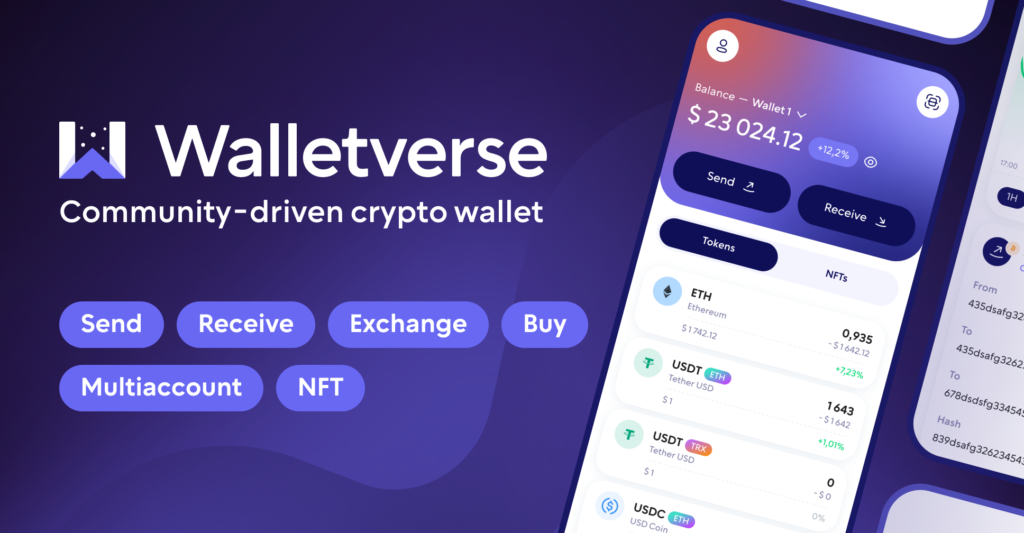
Walletverse stands out as a versatile option for managing ERC-20 tokens. This mobile crypto wallet offers a user-friendly interface for beginners and advanced users. It supports over 300 cryptocurrencies and provides a secure app for storing, buying, and sending digital assets. Key features include passcode and biometric authentication, ensuring only you can access your wallet. Additionally, Walletverse allows you to purchase crypto using various payment methods, including Apple Pay, Google Pay, and credit/debit cards.
Pros:
- Supports over 300 cryptocurrencies, including Bitcoin and Ethereum;
- Secure with biometric authentication and passcode protection;
- Seamless wallet for buying and selling crypto with diverse payment options.
Cons:
- Only mobile applications yet.
2. Trust Wallet
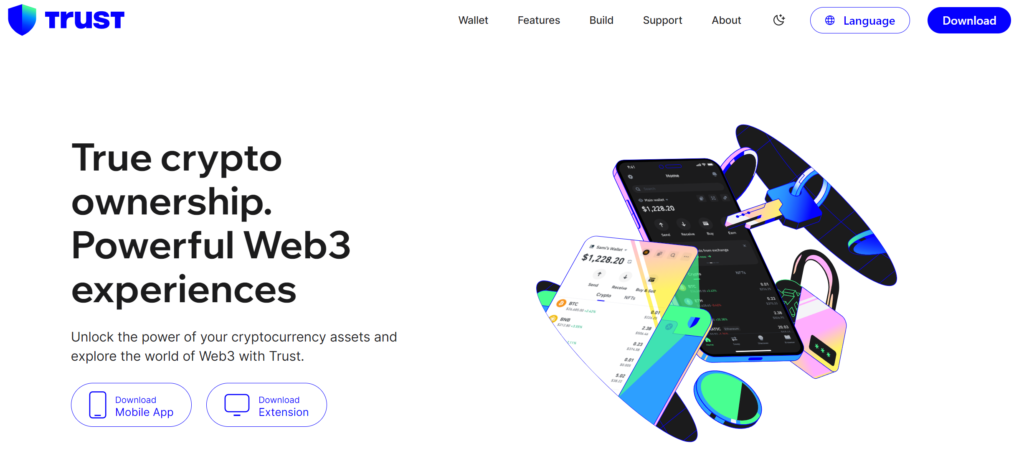
Trust Wallet is a comprehensive Web3 wallet that simplifies transactions and interactions with decentralized applications. It supports over 140 cryptocurrencies and offers features like NFT management and access to dApps and DeFi protocols. The wallet is known for its advanced security measures, which include biometrics and encrypted cloud backup.
Pros:
- Supports NFTs and DeFi protocols;
- No need for personal data;
- Advanced security features.
Cons:
- Advanced features may be complex for beginners;
- Mostly mobile-based, with limited desktop functionality.
3. Exodus Wallet
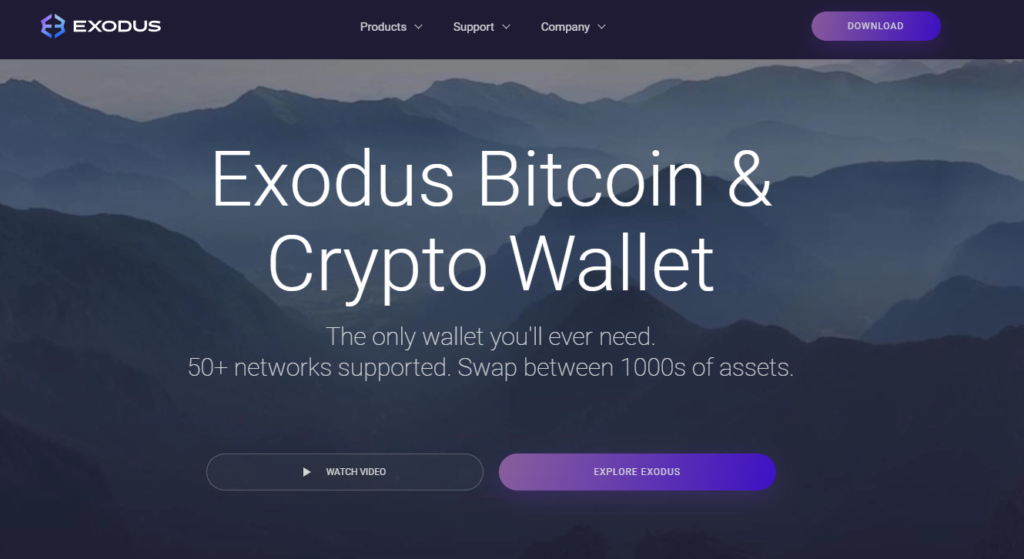
Exodus Wallet is renowned for its multi-chain support, making it a versatile choice for managing ERC-20 tokens and other blockchain assets. Available as a desktop application, browser extension, and mobile app, Exodus enables easy management of digital assets across different devices. It offers a built-in exchange and hardware wallet integration with Trezor.
Pros:
- Multi-chain support, including ERC-20;
- Built-in exchange for trading;
- Hardware wallet integration with Trezor.
Cons:
- Lacks traditional two-factor authentication (2FA);
- It is not open-source, limiting independent security reviews.
4. MetaMask
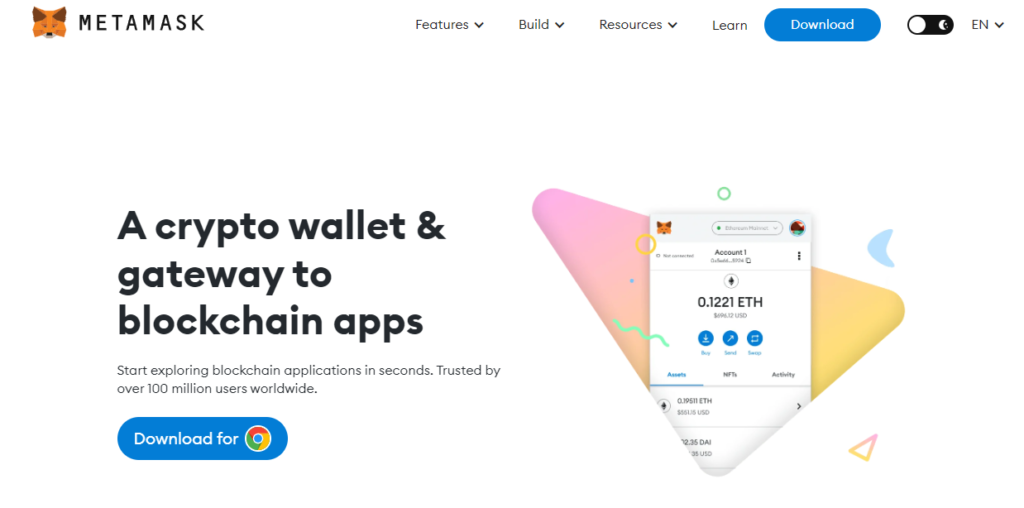
MetaMask is a popular choice for those seeking flexibility and encryption capabilities. This wallet allows users to easily switch between different blockchain networks and integrates well with various hardware wallets. It features a swap function that helps users get the best prices with minimal fees.
Pros:
- Encryption capabilities for security;
- Flexible network switching;
- Integrates with hardware wallets.
Cons:
- Users must be cautious about phishing attacks and fake websites;
- Reliance on Secret Recovery Phrase for account recovery.
5. ZenGo

ZenGo provides a user-friendly ERC-20 wallet with solid security features. Utilizing keyless wallet technology and multi-party computation (MPC) cryptography, ZenGo eliminates private keys, reducing the risk of loss or theft. This innovative approach makes it easier for users to manage their ERC-20 tokens securely.
Pros:
- A keyless wallet system enhances security;
- User-friendly interface for beginners;
- Support for top ERC-20 tokens.
Cons:
- High fees for credit card purchases;
- Limited support for Ethereum Layer 2 solutions.
6. Ledger Nano X
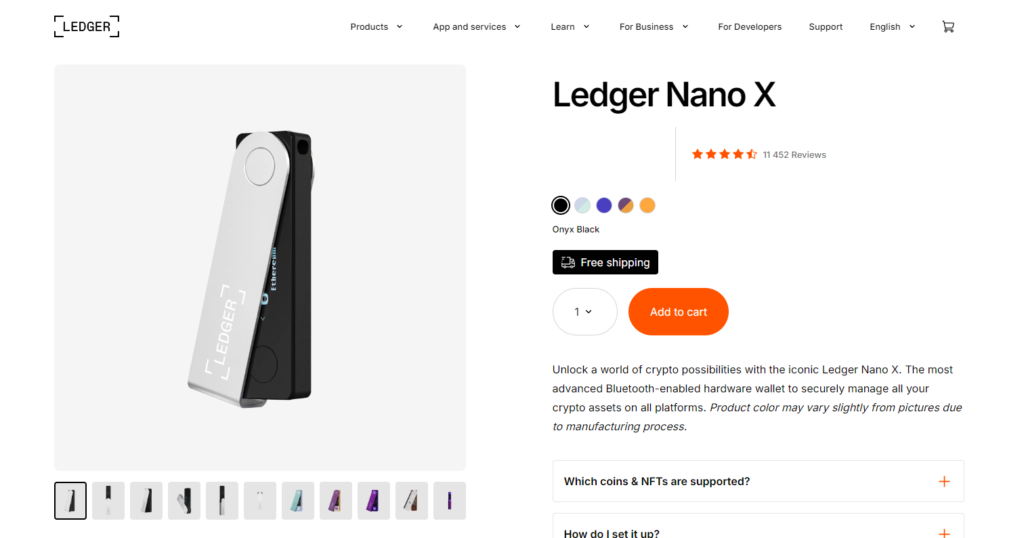
Ledger Nano X is a leading cold ERC-20 wallet that supports over 5,500 cryptocurrencies. It features Bluetooth functionality and integrates with the Ledger Live app, making it easy to manage ERC-20 tokens securely. The wallet’s secure element chip ensures that private keys remain offline and protected from potential hacks.
Pros:
- Bluetooth functionality for convenience;
- Supports over 5,500 cryptocurrencies;
- Secure element chip for enhanced security.
Cons:
- Requires physical device for use;
- Higher cost compared to software wallets.
7. Trezor Model T
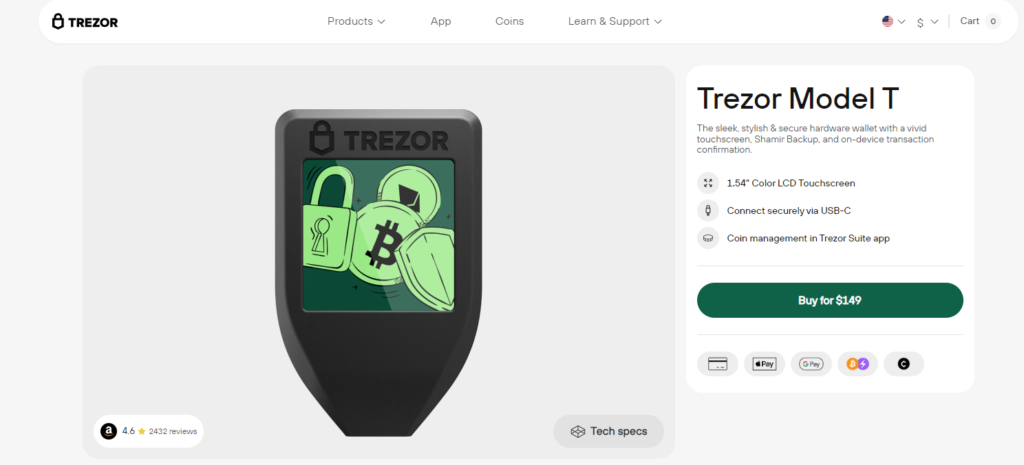
Trezor Model T is another highly regarded cold storage wallet known for its robust security features. It supports a wide range of cryptocurrencies, including ERC-20 tokens, and offers a touchscreen interface for ease of use. Regular firmware updates and strong encryption ensure your assets are well-protected.
Pros:
- Touchscreen interface for ease of use;
- Regular firmware updates;
- Strong encryption and security features.
Cons:
- Higher cost compared to some other wallets;
- Less convenient for mobile use.
How to Choose the Right ERC-20 Wallet
Choosing the right ERC-20 wallet involves evaluating several key factors to ensure it meets your specific needs and preferences. Here’s a comprehensive guide to help you make an informed decision:
Security Features
- Private key management. Decide if you prefer a hot wallet (software-based) or a cold wallet (hardware-based). Hot wallets are more convenient but may be less secure than cold wallets, which store your private keys offline.
- Authentication methods. Look for wallets with multi-factor authentication (MFA), biometric security, and passcodes. These features enhance security by adding additional layers of protection.
- Backup and recovery. Ensure the wallet provides options for backup and recovery, such as seed phrases or recovery keys, to safeguard against loss or theft.
Ease of Use
- User interface. Choose a wallet with an intuitive and user-friendly interface, especially if you are new to cryptocurrency. A straightforward design helps reduce the risk of errors.
- Accessibility. Consider whether the wallet is available on the platforms you use most often, such as mobile (iOS and Android), desktop (Windows, macOS), or as a browser extension.
Features and Functionality
- Multi-currency support. If you hold a diverse portfolio, look for a wallet that supports a wide range of cryptocurrencies, including ERC-20 tokens. Some wallets also offer support for NFTs and dApps.
- Built-in exchanges. Some wallets come with built-in exchange features, allowing you to trade cryptocurrencies directly within the wallet, which can be convenient.
- Staking and earning. If you’re interested in staking or earning rewards on your holdings, choose a wallet that supports these features.
Compatibility and Integration
- dApp and DeFi integration. If you interact with decentralized applications (dApps) or DeFi protocols, ensure the wallet seamlessly integrates with these platforms.
- Hardware wallet compatibility. Some wallets can integrate with hardware wallets like Trezor or Ledger for added security. This is particularly useful if you prefer cold storage.
Reputation and Support
- Community feedback. Research the wallet’s reputation within the crypto community. Read reviews and forums to understand the experiences of other users.
- Customer support. Choose a wallet that offers reliable customer support. Access to support can be crucial if you encounter issues or need assistance.
Cost and Fees
- Transaction fees. Evaluate the wallet’s transaction fees for sending and receiving ERC-20 tokens. Some wallets may have higher fees for certain types of transactions.
- Subscription fees. Check for any subscription fees or costs associated with using the wallet. Many wallets are free, but some premium features may come at a cost.
Choosing the best ERC-20 wallet for 2024-2025 involves balancing usability, security, and features. Whether you prioritize a secure mobile wallet, multi-chain support, or hardware-based protection, the options available cater to newcomers and seasoned crypto enthusiasts. By evaluating the pros and cons of each wallet, you can make an informed decision that suits your specific needs.
FAQ
Most frequent questions and answers
ERC-20 tokens can be purchased on various platforms:
- Centralized exchanges. Major exchanges like Binance, Coinbase, Kraken, and Bitfinex offer a wide range of ERC-20 tokens for purchase.
- Decentralized exchanges (DEXs). Platforms such as Uniswap, SushiSwap, and PancakeSwap facilitate the buying and trading of ERC-20 tokens directly from your wallet.
- Over-the-counter (OTC) services. For large transactions, OTC services provide a more personalized buying experience.
As of now, over 1,000 ERC-20 tokens exist. The ERC-20 token standard has been widely adopted for various projects, each serving different purposes within the Ethereum ecosystem. The circulating supply of the ERC-20 token itself is approximately 1.13 billion.
The best wallet for ERC-20 tokens depends on your individual needs:
- For beginners. Walletverse offers a user-friendly interface and supports a wide range of cryptocurrencies.
- For advanced users. Ledger Nano X and Trezor Model T provide advanced security features and support for many cryptocurrencies.
- For multi-chain support. Walletverse, Exodus Wallet and MetaMask offer comprehensive support for various blockchains and ERC-20 tokens.
The best Ethereum wallet varies based on your preferences:
- For ease of use. Walletverse, Trust Wallet and ZenGo are known for their simplicity and ease of use.
- For security. Ledger Nano X and Trezor Model T are top choices for those prioritizing security.
- For versatility. Walletverse, Exodus Wallet and MetaMask offer a range of features and integrations with dApps and hardware wallets.
ERC-20 is supported by:
- Wallet providers. Most major wallets, including Walletverse, MetaMask, Trust Wallet, and Exodus, support ERC-20 tokens.
- Exchanges. Major cryptocurrency exchanges like Binance, Coinbase, and Kraken list numerous ERC-20 tokens.
- dApps and DeFi platforms. Many decentralized applications and DeFi protocols are built on the Ethereum network and support ERC-20 tokens.
ERC-20 wallets can be obtained from:
- Official websites. Download wallets directly from their official websites to ensure you get the legitimate version.
- App stores. Look for wallets on app stores like Google Play and the Apple App Store for mobile versions.
- Hardware retailers. Purchase hardware wallets from authorized retailers or directly from the manufacturer’s website.